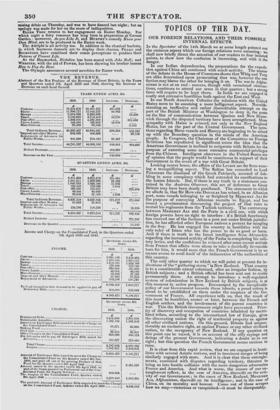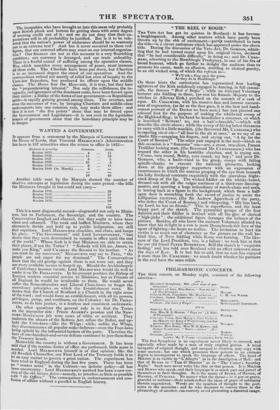TOPICS OF THE DAY.
OUR FOREIGN RELATIONS, AND THEIR POSSIBLE INTERNAL EFFECTS.
IN the Spectator of the 14th March we at some length pointed out the ominous aspect which our foreign relations were assuming we shall now briefly direct the attention of our readers to four isolated points, to show how the confusion is 'increasing, and with it the danger.
In our Indian dependencies, the preparations for the expedi- tion against China are continued with much' activity. The tenour of the debate in the House of Commons shows that Whig and Tory are alike determined upon prosecuting that war, however the one faction may blame the other for bringing it on. The war in Afgha- nistan is not at an end : success, though with occasional obstruc- tions, continues to attend our arms in that quarter ; but a strong force will require to be kept there. In India we are engaged in costly and extensive hostilities both against the East and West. In our North American Colonies the relations with the United States seem to be assuming a more belligerent aspect. Notwith- standing an ineffective and rather discreditable attempt on the part of the British Minister at Washington to deny it, the posts on the line of communication between Quebec and New Bruns- wick through the disputed territory have been strengthened. More sympathy with Maine is evinced, not only in the New England States, but on the part of the Central Government. The ques- tions regarding Slave-vessels and Slavery are beginning to be mixed up with the Boundary question in the minds of the American people. In Congress, the Chairman of the Committee on Foreign Relations has repudiated in significant terms the idea that the American Government is inclined to cooperate with Britain for the purpose of extorting some more extensive commercial•privileges from the Chinese. Intelligent observers in the United States are of opinion that the people would be unanimous in support of their Government in the event of a war with Great Britain.
Looking nearer home, the affairs of the Levant are far from wear- ing a tranquillizing aspect. The Sultan has conceded to Lord
PONSONBY the dismissal of the Greek Patriarch, accused of dab- bling in some conspiracy which had extended its ramifications to the Ionian Islands. But, if there is any truth in a statement con- tained in the Austrian Observer, this act of deferenee to Great Britain may have been dearly purchased. The statement to which we allude is, that Sir HOWARD DOUGLAS has seized, in an Albanian port, some vessels belonging to or freighted by MEHEMET Au for the purpose of conveying Albanian recruits to Egypt, and has Issued a proclamation denouncing the project of that ruler to recruit his regiments from the Turkish territory. The controversy between MEHEMET Au and the Porte is a civil one, with which foreign powers have no right to interfere : if a British functionary has coerced one of the factions in a port not under British jurisdic- tion, he has afforded other European nations a pretext for mingling in the fray. He has engaged his country in hostilities with the
m only ruler of Isla who Fins the power to do us good or harm. And if there is truth in the latest intelligence from Alexandria regarding the increased activity of the Pasha in completing his mili- tary levies, and the confidence he evinced after some recent arrivals from France that affairs were about to take a decidedly favourable turn for him, it would seem that the French Government is by no means averse to avail itself of the indiscretion of the authorities of this country.
The only other quarter to which we will point at present for in- dications of the "gathering storm" is New Zealand. That country is to a considerable extent colonized, after an irregular fashion, by British subjects ; and a British official has been sent out to reside permanently there. An attempt to introduce a well-regulated system of colonization in New Zealand by British subjects, is at this moment in active progress. Encouraged by the inexplicable policy of our Government towards these islands, a penal colony is about to be established on them under the auspices of the Go- vernment of France. All experience tells us, that the result of this must be hostilities, sooner or later, between the French and English settlers' and the involvement of the parent countries in war. This the British Government might have prevented. Prior- ity of discovery and occupation of' countries inhabited by uncivi- lized tribes, according to the international law of Europe, gives the discovering nation the right of territorial property as against all other civilized nations. On this ground, Britain had unques- tionably an exclusive right, as against France or any other civilized nation, to the occupancy of New Zealand. If any question on this point can be raised, it is on account of the 'silly sayings and doings of the present Government, indicating a doubt as to our right ; but this question the French Government seems anxious to raise.
It is clear from this rapid review, that we are engaged in hosti- lities with several Asiatic nations, and in imminent danger of being similarly engaged with more. And it is clear that these entangle- ments, combined with disputes regarding territory, threaten to bring us into hostile collision with the more dangerous adversaries France and America. And what is worse, the causes of our en-
tanglement reflect, in the case of America, discredit on the acti- vity of our Government ; in the cases of New Zealand, MEHEMET ALI, Afghanistan, discredit on its intelligence ; and in the case of China, on its morality and honour. Come out of these scrapes how we may-victorious or vanquished-it must be disreputably. The incapables who have brought us into this mess rely probably upon British pluck and bottom for getting them with some degree of seeming credit out of it : and we do not deny that their ex- pectations will in all probability be justified. But is it to be tole- rated that the nation's power of endurance should be so wantonly put to an extreme test? And has it never occurred to these red- tapists, that our external efforts may react on our internal organiza- tion? Our finances are not at this moment in a very flourishing condition; our currency is deranged, and our trade unhealthy. There is a fearful extent of suffering among the operative classes. War, which unsettles every arrangement of peace, must increase all these evils. The Chartists have been put down, but Chartism is to an increased degree the creed of our operatives. And the contumelious refusal not merely of relief but even of inquiry to the Corn-law Repealers, has produced its effects upon the middle classes. The Haves fear the Have-nets, it is true, but they hate the "preponderating interest." Not only the selfishness, the in- capacity, and ignorance of the dominant caste, have been forced upon their notice: a dislike of the forms of our government—a Republican spirit—is rapidly gaining ground among them. The reverses, and even the successes of war, by bringing Chartists and middle-class maleeontents into one common ruin, may make them allies : and then it is not "the five points" alone that may be forced upon the Government and Legislature—it is not even in the legislative branch of govermnent alone that the hereditary principle may be in danger.



























 Previous page
Previous page